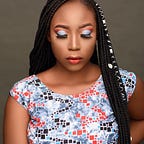My Awani Story
Close your eyes, and imagine a woman in her late youth. Her breasts are sagged, and her caramel-coloured face is streaked with lines of sweat and subjugation. To her back is strapped a months-old baby wailing in hunger, and in her hands is a long pestle, pounding the slices of yam with which to appease the child. This, my dear reader, is the infamous portrait of the Nigerian woman in our society, a society that has in the past hundred years gone through hell and high water to prevent her from rising to the peak of her potential. And as Awani has proven in the last 40 minutes, this portrait must now be replaced.
Awani. Such an eye-opening documentary has raised profound questions and refined my thinking in split seconds. And among all these, one must question the pointless fall of the Nigerian society. How did we become a nation where hosts of women would be massacred in the quest for fairness? A nation where one-fourth of all girls are sexually assaulted before 18, despite our ceaseless emphasis on spirituality? A nation where families would take extreme measures to secure a male child, but then treat the God-given female child with contempt? A society where those in power have not only hidden their ungodly and abnormal intentions behind the masks of religion and tradition, but also hidden our history — and hence the ultimate proofs of feminine potential — from us? British colonization would be a simple answer, but in truth it would be wrong. For the true and terrible colonization still hangs in the Nigerian atmosphere, and its stench is paralyzing.
But we have borne this foul smell long enough. Whether society realizes it or not, the dream of the Nigerian woman remains alive. It is this dream that governed the affairs of Nwagboka, the last Omu of Onitsha, and propelled the icon Funmilayo Ransome-Kuti to ignite a revolt against ‘legal’ extortion. It is this dream that ensures that women continue to oppose oppression using every resource at their disposal — be it their voices and their marches, or their presence on social media, as evidenced in the recent protests against police brutality. And indeed, it is this dream that would guarantee the Nigerian woman a place in today’s world, a world where creativity and talent, the attributes of every woman, have overridden brute physical strength to become the new oil.
So when you watch Awani, my dear reader, you would open your eyes, and you would see this new portrait of the Nigerian woman. You would remember that since the time of colonial Nigeria, the women of our society have suffered violence. But you would rejoice, because while the violent and insecure patriarchy has suppressed us by force for decades, our voices have never been silenced. In fact, we are louder now than we have ever been. And we shall prevail.
You would open your eyes and see the new portrait of a woman forever in her prime.
